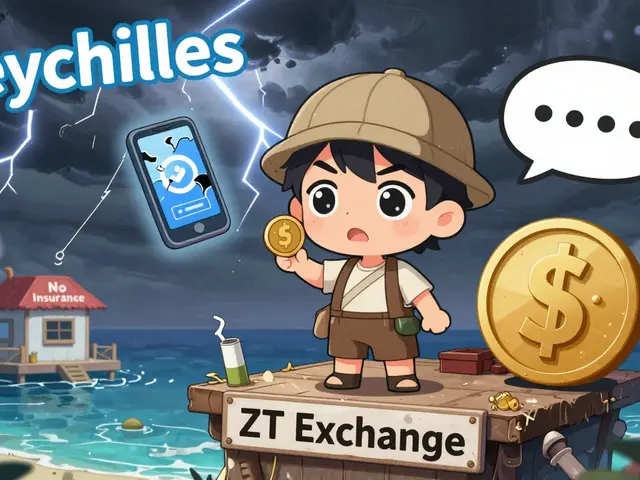By 2025, if you want to trade crypto on any major platform, you must prove who you are. No more skipping KYC. It’s not optional anymore-it’s the gatekeeper. What started as a banking rule copied into crypto has become the backbone of the entire industry. The days of anonymous Bitcoin trades on big exchanges are over. And it’s not just about following the law. It’s about survival.
KYC Isn’t Going Away-It’s Getting Smarter
In 2022, getting verified on a crypto exchange could take days. Now, it takes under four minutes on platforms using AI-powered systems. That’s not magic. It’s technology catching up to regulation. Modern KYC tools scan your ID, match your face with a live selfie, check your address, and cross-reference you against 1,700+ global watchlists-all in seconds. Accuracy? 99.2%. False positives? Less than 1%. That’s better than most banks. This isn’t just about speed. It’s about scale. In 2025, 92% of centralized exchanges enforce full KYC. That’s up from 67% in 2021. Why? Because regulators aren’t asking anymore-they’re demanding. The Financial Action Task Force (FATF) made it clear: crypto exchanges are financial institutions. That means they need to do the same checks as banks. And if they don’t? Fines. Suspensions. Shut downs. Binance.US paid a $2.3 million fine in June 2025 for weak KYC controls. That’s not an outlier-it’s a warning.The Big Divide: Centralized vs. Decentralized Exchanges
Here’s where things get messy. Centralized exchanges (CEXs) like Coinbase, Kraken, and Binance? Fully locked down. You need ID, proof of address, and sometimes even source-of-funds docs if you’re moving over $10,000. But decentralized exchanges (DEXs)? Most still let you trade without a single document. Less than 15% of DEXs even try to verify users. Why the gap? It’s built into the design. DEXs run on smart contracts. No middleman. No central database. That’s the whole point. But FATF’s Travel Rule-requiring exchanges to share user info on transactions over $30,000-doesn’t work on DEXs. So most ignore it. That’s why DEXs now handle less than 12% of total crypto trading volume. They’re not dead, but they’re shrinking. And regulators are watching. The next wave? Blockchain analytics tools that track wallet activity across DEXs. If your wallet sends funds to a sanctioned address-even through a DEX-you’re flagged. That’s changing the game. Anonymity isn’t gone, but it’s getting riskier.What’s Actually Required? The Real KYC Checklist
If you’re signing up for a regulated exchange today, here’s what you’ll need:- A government-issued photo ID (passport, driver’s license, national ID)
- Proof of address (utility bill, bank statement-must be under 90 days old)
- A live selfie or video verifying you’re the person in the ID
- Answering questions about your trading intent and source of funds

Privacy vs. Compliance: The Tug-of-War
Let’s be honest: most people don’t like handing over their ID to a tech company. In 2025, 76% of crypto users say they’re concerned about how their data is used. Reddit threads are full of complaints: “Why do I need to send my passport to a company in Estonia?” “I got flagged for a false positive and lost access for two weeks.” “No one explained what they do with my data.” The truth? Many exchanges aren’t great at explaining. Only 41% of users report getting clear info on data retention, sharing, or deletion policies. That’s a trust problem. And trust is currency in crypto. Privacy advocates like the Electronic Frontier Foundation warn that aggressive KYC could erode financial freedom. But regulators counter: without KYC, crypto becomes a haven for criminals. In 2025, over 1,200 sanctioned crypto wallets were flagged for suspicious activity-up 32% from last year. That’s not just numbers. That’s real money laundering. And KYC helped catch it.The Tech That’s Changing Everything
The future of KYC isn’t just faster scans. It’s smarter systems. Here’s what’s coming:- Zero-knowledge proofs (ZKPs): You prove you’re over 18, or not on a sanctions list, without showing your actual ID. Think of it like proving you have a valid license without handing over the plastic. The World Economic Forum says this could be mainstream by 2027.
- CBDCs with built-in KYC: Central Bank Digital Currencies-like the digital dollar or euro-will require identity verification at the wallet level. No KYC? No access. That’ll push even DEX users toward compliance.
- Continuous KYC (cKYC): Instead of one-time checks, your activity is monitored 24/7. If you suddenly start sending funds to high-risk jurisdictions, you get flagged. 71% of top exchanges already use risk-based monitoring like this.
- Global identity networks: The OECD is pushing for shared beneficial ownership registries by 2027. Imagine one verified identity you use across borders. No more uploading your ID to 10 different platforms.
Who’s Winning the KYC Tech Race?
The market for crypto KYC tools is worth $4.7 billion-and it’s growing fast. The top five providers-Sumsub, Shufti Pro, Onfido, Jumio, and Trulioo-control nearly 70% of the market. Why? They’re not just selling software. They’re selling reliability. Sumsub’s AI boosts approval rates by 22% because it understands regional ID formats and reduces false rejections. Shufti Pro verifies users in 8-10 seconds against 1,700+ watchlists. That’s the kind of speed exchanges need to keep users from abandoning sign-ups. Smaller platforms? They’re struggling. Setting up full KYC costs around $185,000 a year. That’s why only 32% of small exchanges have full compliance. Most rely on third-party providers, but even that’s getting harder. Regulators are cracking down on providers too. If your KYC vendor fails an audit, your exchange gets dragged down with it.
The Legal Wild West: US vs. EU vs. Rest of the World
Regulation isn’t the same everywhere. In the U.S., it’s a mess. The SEC says some tokens are securities. The CFTC says Bitcoin is a commodity. The IRS taxes it as property. And now, the GENIUS Act (passed August 2025) tries to create one federal standard. But it’s still unclear how it’ll play out with state laws. Over 60% of exchanges say conflicting state rules are their biggest headache. The EU? Cleaner. MiCA (Markets in Crypto-Assets Regulation) forces all member states to follow the same KYC rules. It’s strict, but consistent. Japan requires full KYC and even bans anonymous trading. Some Middle Eastern countries are experimenting with blockchain-based national IDs-your crypto wallet links to your government identity. The takeaway? If you’re trading globally, you’re dealing with 10 different rulebooks. That’s why cross-border KYC remains a nightmare for 38% of exchanges.What’s Next? The Road to 2027
By 2027, 99% of regulated exchanges will have full KYC. That’s Gartner’s prediction. The only question is: how? The trend is clear: compliance is becoming seamless. You won’t notice it because it’ll be built into the experience. Your wallet will auto-verify when you connect to a regulated service. Your tax software will pull KYC data for 1099-DA forms starting in 2026. Banks will require full identity checks before letting you move crypto in or out. Privacy tech like zero-knowledge proofs will help ease the tension. But they won’t replace KYC-they’ll refine it. You’ll still be verified. You’ll just control what’s shared. The real winners? Users who understand the system. The ones who know their rights, read privacy policies, and choose platforms that explain their data use. The losers? Those who think anonymity is still possible on big platforms-and get locked out when the rules change.Final Thought: KYC Is the New Normal
Crypto’s early days were about rebellion-bypassing banks, avoiding governments, staying anonymous. That era is over. The future belongs to systems that balance freedom with responsibility. KYC isn’t the enemy. Poorly designed, opaque, and unregulated KYC is. The best platforms won’t just check your ID. They’ll explain why. They’ll let you control your data. They’ll use tech to protect your privacy, not just to monitor you. If you’re in crypto today, you’re not just a trader. You’re a participant in a new financial system. And that system requires identity. The question isn’t whether KYC will survive. It’s whether you’ll adapt to it-or get left behind.Is KYC mandatory for all crypto exchanges in 2025?
Yes, for centralized exchanges (CEXs), KYC is mandatory in 92% of cases globally. If you want to trade on Coinbase, Kraken, Binance, or any major regulated platform, you must complete KYC. Decentralized exchanges (DEXs) are the exception-less than 15% enforce KYC, but they handle under 12% of total trading volume. Regulatory pressure is pushing even DEXs toward compliance.
What documents do I need for crypto KYC in 2025?
You’ll typically need: a government-issued photo ID (passport or driver’s license), proof of address (utility bill or bank statement under 90 days old), and a live selfie or video to match your face to the ID. For higher-risk users or large transactions, you may also need to explain your source of funds-like pay stubs, tax returns, or bank statements showing where the money came from.
Can I still trade crypto anonymously in 2025?
Technically, yes-but it’s limited. You can still use some DEXs or Bitcoin ATMs without KYC. However, these options represent less than 12% of total trading volume. Any funds moved to a regulated exchange later will trigger KYC checks. Plus, blockchain analytics tools now track wallet activity across DEXs. If your wallet interacts with a sanctioned address, you’ll be flagged-even if you never submitted ID.
Why do I keep getting flagged in KYC even when I’ve done nothing wrong?
False positives happen. AI systems flag transactions based on patterns-like sending funds to a wallet linked to a past sanctions case, or using a VPN, or having a common name. Around 12.3% of flagged transactions are false. If this happens, you’ll need to provide additional documentation or wait for manual review. Some platforms offer appeal processes, but it can take days. Choose exchanges with strong customer support to reduce frustration.
Will zero-knowledge proofs replace KYC in crypto?
No-they’ll enhance it. Zero-knowledge proofs (ZKPs) let you prove you meet a requirement (like being over 18 or not on a sanctions list) without revealing your actual identity data. Think of it as a digital notarized stamp. You’re still verified, but your personal details stay private. By 2027, ZKPs are expected to be standard in compliant crypto wallets, making KYC more private-not optional.
How does KYC affect my taxes in 2025?
KYC is now directly tied to tax reporting. Starting in 2026, U.S. crypto users must file Form 1099-DA for all transactions, which requires full identity and transaction data from exchanges. If your KYC info is incomplete or outdated, your exchange can’t report accurately-and you risk IRS penalties. Keeping your KYC updated isn’t just about access-it’s about tax compliance.
What happens if I lie on my KYC form?
Lying on KYC is fraud-and it’s traceable. AI systems cross-check your ID with government databases, facial recognition, and address validation. If caught, your account will be frozen, funds seized, and you could face legal action. Regulators treat crypto fraud the same as traditional financial fraud. Fines can reach millions, and criminal charges are possible. Never falsify information.
Can I delete my KYC data after closing my crypto account?
Under GDPR (EU) and CCPA (California), you have the right to request deletion of your personal data. But exchanges can keep it for up to 5-10 years for regulatory record-keeping. When you close an account, ask for a written confirmation of data deletion. Most reputable platforms will comply-but only after the legal retention period ends. Don’t assume deletion is immediate.







Drew Monrad
November 13, 2025 AT 19:19Becky Shea Cafouros
November 14, 2025 AT 11:15Cody Leach
November 15, 2025 AT 06:03sandeep honey
November 16, 2025 AT 17:16Mandy Hunt
November 18, 2025 AT 08:28anthony silva
November 20, 2025 AT 06:39David Cameron
November 22, 2025 AT 03:55Sara Lindsey
November 23, 2025 AT 10:55alex piner
November 24, 2025 AT 06:10Gavin Jones
November 24, 2025 AT 16:02Mauricio Picirillo
November 26, 2025 AT 02:05Liz Watson
November 26, 2025 AT 02:45Kandice Dondona
November 27, 2025 AT 03:27Rachel Anderson
November 27, 2025 AT 20:18Hamish Britton
November 29, 2025 AT 11:49Robert Astel
November 30, 2025 AT 16:10Andrew Parker
December 2, 2025 AT 02:21Kevin Hayes
December 3, 2025 AT 08:58Katherine Wagner
December 5, 2025 AT 06:13ratheesh chandran
December 7, 2025 AT 00:38Hannah Kleyn
December 7, 2025 AT 21:30gary buena
December 7, 2025 AT 21:44Vanshika Bahiya
December 9, 2025 AT 00:00Albert Melkonian
December 9, 2025 AT 04:02